
Acta Herpetologica
metrics 2024
Your Gateway to Herpetological Insights
Introduction
Acta Herpetologica, published by FIRENZE UNIV PRESS, is a reputable Open Access journal dedicated to the field of herpetology, encompassing research on amphibians and reptiles. Established with the aim to foster scientific discourse, this journal has made its content freely accessible since 2006, enabling researchers, professionals, and students to engage with a diverse array of studies and findings. As of 2023, the journal is categorized in Q3 of Animal Science and Zoology and ranks 357 out of 490 in the Scopus database, reflecting its contribution to the field and providing a platform for high-quality research. The journal showcases manuscripts that cover a wide range of topics, from ecology and conservation to physiology and evolution, supporting global efforts to understand and preserve herpetofauna. With a convergence period spanning from 2009 to 2024, Acta Herpetologica continues to be an essential resource for advancing academic knowledge and facilitating discussions in herpetological research.
Metrics 2024
 0.22
0.22 0.60
0.60 0.90
0.90 20
20Metrics History
Rank 2024
Scopus
IF (Web Of Science)
JCI (Web Of Science)
Quartile History
Similar Journals

Nature Conservation Research
Fostering innovation in the fight against biodiversity loss.Nature Conservation Research is a prominent open-access journal that has been dedicated to advancing the field of conservation science since its inception in 2016. Published by the SARANSK FOND PODDERZKI & RAZVITIA ZAPOVEDNYH in the Russian Federation, this journal serves as a vital platform for researchers, professionals, and students alike, providing critical insights into ecological and environmental issues. With an impressive impact factor and ranked in the second quartile across multiple categories—including Agricultural and Biological Sciences, Earth and Planetary Sciences, Ecology, and Nature and Landscape Conservation—Nature Conservation Research stands at the forefront of impactful scientific discourse. The journal not only aims to disseminate high-quality research findings but also seeks to foster collaboration and innovation in conservation practices globally. By ensuring open access to its content, it promotes widespread dissemination of knowledge, crucial in the fight against biodiversity loss and environmental degradation. Researchers and practitioners contributing to the journal will find themselves at the convergence of science and conservation efforts, paving the way for sustainable ecosystem management.

AMPHIBIA-REPTILIA
Pioneering Discoveries in Zoology and EcologyAMPHIBIA-REPTILIA, published by BRILL, stands as a prominent journal in the field of zoology and ecology, specializing in herpetology, the study of amphibians and reptiles. With a rich history since its inception in 1980, this journal aims to disseminate high-quality, peer-reviewed research that advances our understanding of these vital vertebrate groups. Holding a commendable 2023 Q2 ranking in both Animal Science and Zoology and Ecology, Evolution, Behavior and Systematics, it is recognized for its contributions to the scientific community. Researchers are encouraged to submit their manuscripts, benefiting from the journal's commitment to academic excellence, which is showcased in its operational transparency and rigorous editorial process. Though currently not open access, the journal's findings are pivotal for advancing conservation efforts and ecological studies, making it an essential resource for scholars, professionals, and students invested in these important fields.
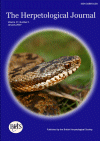
HERPETOLOGICAL JOURNAL
Connecting researchers and conservationists for impactful insights.Herpetological Journal, published by the British Herpetological Society, is a prominent platform dedicated to publishing high-quality research in the fields of herpetology, ecology, and conservation. With its ISSN 0268-0130, this journal has established a significant presence in the academic community, especially as it continues its publication journey from 1987 to 2024. Notably, the journal boasts a commendable impact factor, being ranked in the second quartile (Q2) for Animal Science and Zoology, and holds a third quartile (Q3) ranking in other essential categories including Ecological Modeling and Ecology, Evolution, Behavior and Systematics. The Herpetological Journal serves as an indispensable resource for researchers, professionals, and students, fostering the exchange of innovative ideas and insights crucial to the understanding of reptiles and amphibians. Although the journal currently does not offer open access, it remains a vital choice for those invested in the ongoing dialogue around herpetological studies and nature conservation.
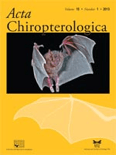
ACTA CHIROPTEROLOGICA
Connecting Research and Conservation for ChiropteraACTA CHIROPTEROLOGICA is a prominent international journal dedicated to the field of bat research, published by the Museum & Institute of Zoology PAS-Polish Academy of Sciences. With its commitment to scholarly excellence, this journal serves as a vital platform for scientists, researchers, and students exploring various aspects of chiropterology, including ecology, behavior, conservation, and taxonomy of bats. The journal has been consistently recognized for its high-quality contributions, holding a commendable Q2 status in the categories of Animal Science and Zoology as of 2023, and ranking #191 out of 490 in Agricultural and Biological Sciences according to Scopus, placing it in the 61st percentile. Although ACTA CHIROPTEROLOGICA does not operate under an open access model, its rigorous peer-review process and focus on innovative research provide invaluable insights and advancements in the understanding of bat biology and conservation. This journal not only bridges the gap between theoretical knowledge and practical applications but also highlights the importance of protecting these key species within our ecosystems. With a history spanning over two decades, from its inception in 1999 to ongoing contributions anticipated through to 2024, ACTA CHIROPTEROLOGICA continues to be an essential reference for anyone invested in the vibrant field of chiropterological research.

AMPHIBIAN & REPTILE CONSERVATION
Preserving Nature's Wonders Through Innovative ResearchAMPHIBIAN & REPTILE CONSERVATION, published by the Amphibian Conservation Research Center & Lab, is a leading journal dedicated to the field of herpetology and environmental conservation. With an ISSN of 1083-446X and an E-ISSN of 1525-9153, this journal serves as a vital resource for researchers, conservationists, and students interested in the preservation of amphibian and reptile species. The journal has achieved remarkable rankings, categorized in the Q2 quartile for Animal Science and Zoology, Ecology, and Nature and Landscape Conservation as of 2023, reflecting its significant contribution to the scientific community. Over the converged years from 2016 to 2024, the journal has established itself as an integral platform for disseminating research findings, fostering collaboration, and enhancing the understanding of biodiversity and ecosystem dynamics. By embracing an open-access approach, AMPHIBIAN & REPTILE CONSERVATION ensures that critical research is readily available to a global audience, promoting informed conservation efforts and policy advocacy to safeguard these vital species amidst their declining populations.
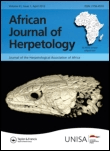
AFRICAN JOURNAL OF HERPETOLOGY
Bridging Research and Conservation for African SpeciesThe AFRICAN JOURNAL OF HERPETOLOGY, published by TAYLOR & FRANCIS LTD, serves as a pivotal resource in the field of herpetology, encompassing the study of reptiles and amphibians. With an ISSN of 2156-4574 and an E-ISSN of 2153-3660, this journal offers a platform for researchers to disseminate their findings and advance knowledge in this dynamic area of biology. Recognized in 2023 with a category quartile ranking of Q2 in Animal Science and Zoology and Q3 in Ecology, Evolution, Behavior, and Systematics, the journal highlights impactful research to a global audience. By providing access to robust, peer-reviewed content, the journal contributes significantly to ongoing debates and discoveries, thus appealing to academics, professionals, and students alike. The journal's converged publication years, spanning from 1996 to 2000 and from 2002 to 2024, signify a long-standing commitment to the field, ensuring that emerging trends and critical issues in herpetology remain at the forefront. Engaging with this journal not only enhances your understanding of amphibian and reptile biology but also connects you to a community dedicated to the conservation and sustainable management of these vital species.

NOVITATES CARIBAEA
Navigating the Depths of Caribbean Natural HeritageNOVITATES CARIBAEA is a distinguished academic journal dedicated to the exploration of Caribbean natural history, fostering a deep understanding of the region's biodiversity and ecological significance. Published by the MUSEO NACIONAL HISTORIA NATURAL-SANTO DOMINGO, this open-access journal has been a platform for scholarly communication since 2009, aiming to provide unrestricted access to high-quality research outputs. With its commitment to promoting research in Caribbean ecosystems, NOVITATES CARIBAEA plays a crucial role in the academic community, facilitating knowledge exchange among researchers, professionals, and students. The journal welcomes submissions exploring various aspects of natural history, including taxonomy, conservation biology, and ecological studies, making it an essential resource for those dedicated to understanding and preserving the unique environments of the Caribbean.
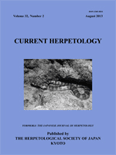
CURRENT HERPETOLOGY
Pioneering research in herpetology since 2000.CURRENT HERPETOLOGY is a leading journal dedicated to the study of reptiles and amphibians, published by the Herpetological Society of Japan in collaboration with the Graduate School of Science at Kyoto University. With its ISSN 1345-5834 and E-ISSN 1881-1019, this journal serves as a vital platform for sharing significant research findings in the field of herpetology. The journal has been continuously contributing to the scientific community since its inception in 2000, with a scope that embraces diverse topics including ecology, behavior, conservation, and physiology of herpetofauna. Recognized for its scholarly impact, CURRENT HERPETOLOGY holds a commendable position within the Q3 quartile in the Animal Science and Zoology category, ranking 350 out of 490 according to Scopus metrics. Although it is not currently an open-access journal, it caters to an audience comprising researchers, professionals, and students looking to deepen their understanding and engage with cutting-edge studies. Based in Japan, at the Department of Zoology in Kyoto, this journal is poised to foster advancements in herpetological research and promote global collaboration in this vital area of science.
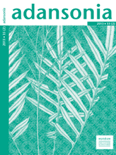
ADANSONIA
Connecting scholars for a greener tomorrow.ADANSONIA is a distinguished, peer-reviewed open access journal dedicated to advancing the field of plant science. Published by the Publications Scientifiques du Museum in Paris since 2000, this journal serves as a critical platform for sharing innovative research and discoveries in botany, ecology, and related disciplines. With its ISSN 1280-8571 and E-ISSN 1639-4798, ADANSONIA boasts a notable Scopus rank of #383 in the Agricultural and Biological Sciences category and a 2023 category quartile ranking of Q3 in Plant Science, indicating a meaningful contribution to the academic community. The journal's scope encompasses a broad range of topics, making it a vital resource for researchers, professionals, and students alike who are exploring the complexities of plant biology. Based in France, ADANSONIA not only enhances visibility for groundbreaking research but also facilitates open communication amongst scholars, ensuring that knowledge on plant science is accessible worldwide. Located at CP 39-57, Rue Cuvier, F-75231 Paris Cedex 05, France, this journal stands as a testament to the collaborative efforts in the pursuit of scientific excellence in plant sciences.

Journal of Asia-Pacific Biodiversity
Bridging disciplines to enhance understanding of ecological dynamics.Journal of Asia-Pacific Biodiversity is an esteemed academic journal dedicated to advancing knowledge in the dynamic fields of biodiversity, ecology, and related biological sciences. Published by the NATL SCIENCE MUSEUM & KOREAN NATL ARBORETUM, this journal serves as a crucial platform for researchers and professionals seeking to explore and disseminate impactful findings pertaining to the Asia-Pacific region's rich biological diversity. With an E-ISSN of 2287-9544, the journal is indexed in leading databases, achieving a Q3 ranking across various categories in 2023, including Animal Science and Zoology, Ecology, Insect Science, and Plant Science. It strives to unite scientific research across disciplines, thus fostering a deeper understanding of ecological dynamics and conservation efforts within this vital region. The journal operates with an open access policy, ensuring that findings are widely available for widespread benefit, making it an essential resource for students, researchers, and environmental practitioners alike. Since its initiation in 2013 and continuing through 2024, the journal remains committed to delivering high-quality, peer-reviewed articles that contribute significantly to the global conversation on biodiversity and ecosystem sustainability.